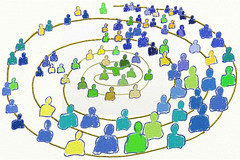A blog on social software, collaboration, trust, security, privacy, and internet tools by Christopher Allen.

With Google+ almost two weeks into its test phase, conversation about this new social network service seems to be going in circles.
Literally.
That’s because Circles is the Google+ feature that users are generating the most buzz about. It’s Google’s answer to the problem of organizing your social graph online.
If you’re not familiar with a social graph it’s a map of everyone you know and how they are related to you.

We live in a world of conversation, of language; all full of words. Mastery of language requires learning the meanings of thousands of words. The average native English language speaker uses in the realm of 12,000 to 20,000 words, whereas a college graduate would use 20-25,000 words. Shakespeare actively used more then 30,000 words, and his vocabulary was estimated to be over 66,000 words. Yet there are, at the very least, a quarter of a million distinct English words, excluding inflections, and words from technical and regional vocabularies.

I'm in Seoul, South Korea this week for the 13th Global Forum on Business Driven Action Learning and Executive Development, where I'm presenting on the topic of the how to get involved with the Social Web.
My presentation is an offshoot of an odd sideline of mine, executive blog and social web coaching. Basically, many times over the last couple of years I've been asked by colleagues and friends to help them with the social web.

by Christopher Allen & Shannon Appelcline
[This is the third in a series of articles on collective choice, co-written by my collegue Shannon Appelcline. It will be jointly posted in Shannon's Trials, Triumphs & Trivialities online games column at Skotos.]
In our first article on collective choice we outlined a number of different types of choice systems, among them voting, polling, rating, and ranking. Since then we've been spending some time expanding upon the systems, with the goal being to create both a lexicon of and a dialogue about systems for collective choice.
 With Google+ almost two weeks into its test phase, conversation about this new social network service seems to be going in circles.
Literally.
That’s because Circles is the Google+ feature that users are generating the most buzz about. It’s Google’s answer to the problem of organizing your social graph online.
If you’re not familiar with a social graph it’s a map of everyone you know and how they are related to you.
With Google+ almost two weeks into its test phase, conversation about this new social network service seems to be going in circles.
Literally.
That’s because Circles is the Google+ feature that users are generating the most buzz about. It’s Google’s answer to the problem of organizing your social graph online.
If you’re not familiar with a social graph it’s a map of everyone you know and how they are related to you.
